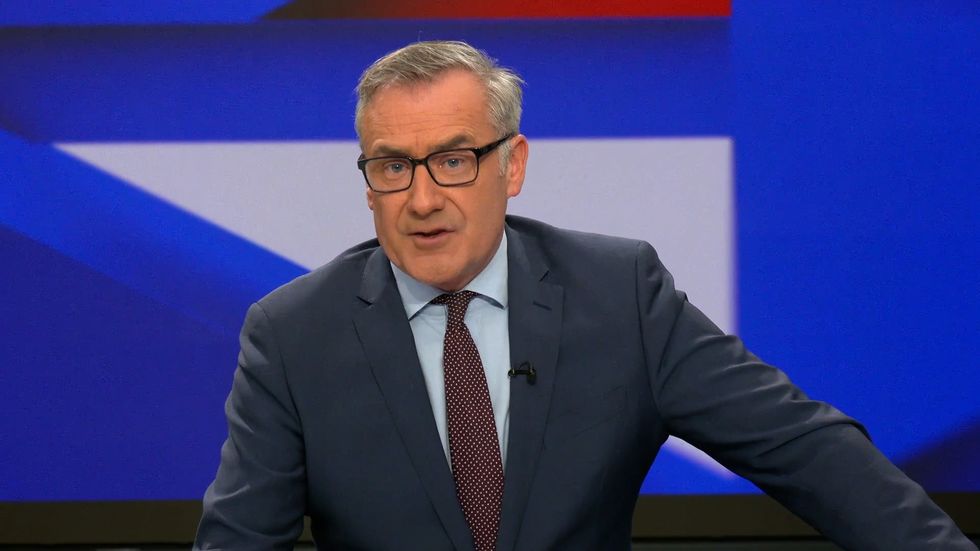Colin Brazier: Britain’s broadcasters have once again shown, that for all their talk of diversity, they’re only interested in looking at things in the same way


The comedian Lenny Henry has told Britain’s broadcasters not to use that ugly acronym BAME.
I think he’s spot on. About a million years ago, when I started as a cub reporter on a local newspaper, we were told journalists should never deal in generalisations.
Where possible, we should be specific. And BAME – Black, Asian and Minority Ethnic – lumps together people whose identities often have very little in common, other than they are not white.
I think Sir Lenny is right. But the reaction to his intervention is so, so wrong.
By which I mean what? Well, it’s one thing for an esteemed public figure, and the lobby group which bares his name, to call for changes in the way we talk.
The way we describe the world around us. But it’s another thing entirely when, en masse and on the instant, every one of Britain’s terrestrial broadcasters decide to fall into line with his demand.
And that’s what happened this week. The BBC, Channel 4, ITV and Channel 5 jointly agreed they would stop using BAME.
These organisations all employ journalists, who are now effectively being told which words they can use. Just think about that.
And as you do, and before we get into why this matters, let me show to you how this isn’t some weird MediaLand one-off.
This week we learned that the SNP-government in Edinburgh is telling Scots which words it approves of, and which ones it doesn’t. Take a look at this…
Out go words like alcoholic, addict and junkie. In come phrases like “abstinent/person who has stopped using drugs”.
Why use one word, when you can use seven. But if this were just about being verbose, I wouldn’t be so worried. For these dictats aren’t just the enemy of brevity.
There’s something else going on here. And when it boils down to it – it’s about control. I’ll explain.
The SNP leaders who want us to stop using words like addict have presided over a public health catastrophe in Scotland, which has by far the worst record for drug deaths in Europe.
They will say that by avoiding “addict” and “alcoholic” and using bland, meaningless alternatives, they are de-stigmatizing what it is to be a junkie.
But as Shakespeare told us, a rose by any other name smells just as sweetly.
There are things, expensive time-consuming things, the SNP could do about drug and alcohol addiction.
But it’s easier to displace and reframe the debate using language the SNP dictates, literally. It’s about control. Control the language and you begin to control the conversation.
And as with the SNP so with that other acronym, BAME. BAME replaced "ethnic minorities", which was also deemed problematic. Who found it problematic?
A tiny cadre of self-appointed diversity professionals whose livelihoods depend on explaining to us stupid folk, how we should speak about the world around us.
And they can’t explain once, because that would leave them out of work. No, this game works by constant reinvention and re-iteration. "Ethnic minorities" yesterday, BAME today, they, not you, will decide what tomorrow.
BAME’s fall from grace was so quick that until recently the BBC’s diversity boss was happily using it. Why this constant semantic motion? I repeat: the better to ensure those who control the language, control the debate.
Not since Britain was ruled by religious authorities has our language been so tightly governed. Then it was regulated by a priesthood.
Now we have a secular race relations and diversity industry which is its equal. You might think this doesn’t matter. Not really.
But by setting up a linguistic purity test, those who do so, do in the expectation that some will fail it. Those who fail it can be replaced. By someone to their liking.
Take one example of many. Last year the FA boss, a man seemingly without a racist bone in his body, was hounded from office for committing a cardinal sin; for getting the ever-changing jargon wrong, in his case by referring to coloured players.
As someone who loves the English language, part of my objection to what’s happening is aesthetic. Look at this; part of the joint statements put out this week by our broadcasters.
This one was from ITV’s Group Director of Diversity and Inclusion: “We will use the findings to build on our internal race fluency training.”
Race fluency training? No, I’ve got no idea what he’s talking about. But that’s exactly as it’s meant to be.
The Soviet communists called these people the nomen-klatura, the self-selecting elite who use language to bamboozle and keep in line those outside of the magic circle.
By creating this bizarre semantic cartel, Britain’s broadcasters have once again shown, that for all their talk of diversity, they’re only interested in looking at things in the same way.